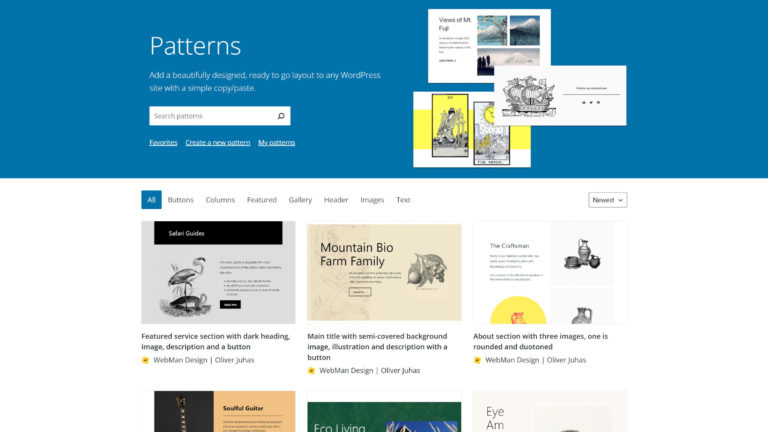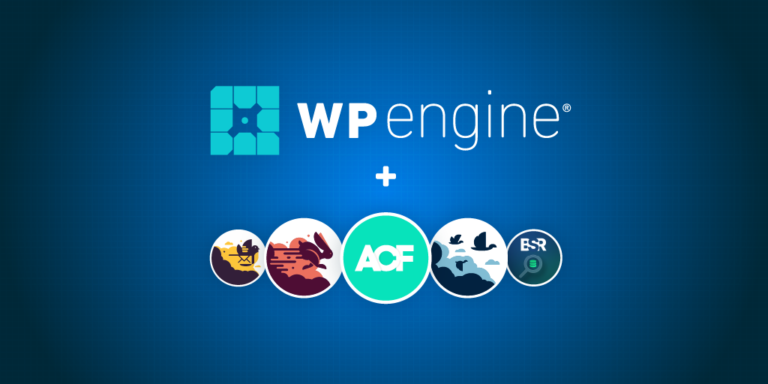
Join us for State of the Word 2021, in person or online!
…Full post on Dot Org News
Read Full

…Full post on Dot Org News
Read Full

As you likely know, WordPress software powers 46% of all websites on the Internet. I thought it would be fun to dive a bit deeper and note some trends that affect the WP community. WordPress powers 46% of all websites on the Internet WordPress usage remains dominant and steady Antiquated software is still used quite…

Advanced Custom Fields (ACF), one of the plugins WP Engine acquired from Delicious Brains in 2022, has published the results if its first annual survey. Although ACF reports more than 4.5 million active users, including PRO site installs, the survey only gathered feedback from 2,031 respondents. These results are more representative of the plugin’s developer community, as…

The WordPress pattern directory finally opened its gates to the entire community today. Anyone with a WordPress.org account can log in, go to the pattern creator, and start designing. For some of us, this has felt like an unbearably long wait. In reality, it took the development team less than a year since the directory…

Twitter experienced a major outage today lasting several hours, which left most users unable to tweet or send private messages to each other. Some reported receiving error messages telling them they were “over the daily limit for sending tweets.” Twitter’s development team took the opportunity to update users on the upcoming changes to API access,…

Delicious Brains, a WordPress product company founded in 2012 by Brad Touesnard, has sold five of its plugins to WP Engine: Advanced Custom Fields (ACF), WP Migrate, WP Offload Media, WP Offload SES, and Better Search Replace. Over the past four years, WP Engine has been scooping up developer tools through acquisitions, including StudioPress and the…

It seems that Andrew Starr is quietly building a legion of block themes. He is the sole developer behind UXL Themes and has released six of them in the past year, with most landing in the last few months. Framboise, his latest project, is a child theme of Alara. He promised a new design variation,…

As you likely know, WordPress software powers 46% of all websites on the Internet. I thought it would be fun to dive a bit deeper and note some trends that affect the WP community. WordPress powers 46% of all websites on the Internet WordPress usage remains dominant and steady Antiquated software is still used quite…

Advanced Custom Fields (ACF), one of the plugins WP Engine acquired from Delicious Brains in 2022, has published the results if its first annual survey. Although ACF reports more than 4.5 million active users, including PRO site installs, the survey only gathered feedback from 2,031 respondents. These results are more representative of the plugin’s developer community, as…

The WordPress pattern directory finally opened its gates to the entire community today. Anyone with a WordPress.org account can log in, go to the pattern creator, and start designing. For some of us, this has felt like an unbearably long wait. In reality, it took the development team less than a year since the directory…

Twitter experienced a major outage today lasting several hours, which left most users unable to tweet or send private messages to each other. Some reported receiving error messages telling them they were “over the daily limit for sending tweets.” Twitter’s development team took the opportunity to update users on the upcoming changes to API access,…

Delicious Brains, a WordPress product company founded in 2012 by Brad Touesnard, has sold five of its plugins to WP Engine: Advanced Custom Fields (ACF), WP Migrate, WP Offload Media, WP Offload SES, and Better Search Replace. Over the past four years, WP Engine has been scooping up developer tools through acquisitions, including StudioPress and the…

It seems that Andrew Starr is quietly building a legion of block themes. He is the sole developer behind UXL Themes and has released six of them in the past year, with most landing in the last few months. Framboise, his latest project, is a child theme of Alara. He promised a new design variation,…

As you likely know, WordPress software powers 46% of all websites on the Internet. I thought it would be fun to dive a bit deeper and note some trends that affect the WP community. WordPress powers 46% of all websites on the Internet WordPress usage remains dominant and steady Antiquated software is still used quite…

Advanced Custom Fields (ACF), one of the plugins WP Engine acquired from Delicious Brains in 2022, has published the results if its first annual survey. Although ACF reports more than 4.5 million active users, including PRO site installs, the survey only gathered feedback from 2,031 respondents. These results are more representative of the plugin’s developer community, as…